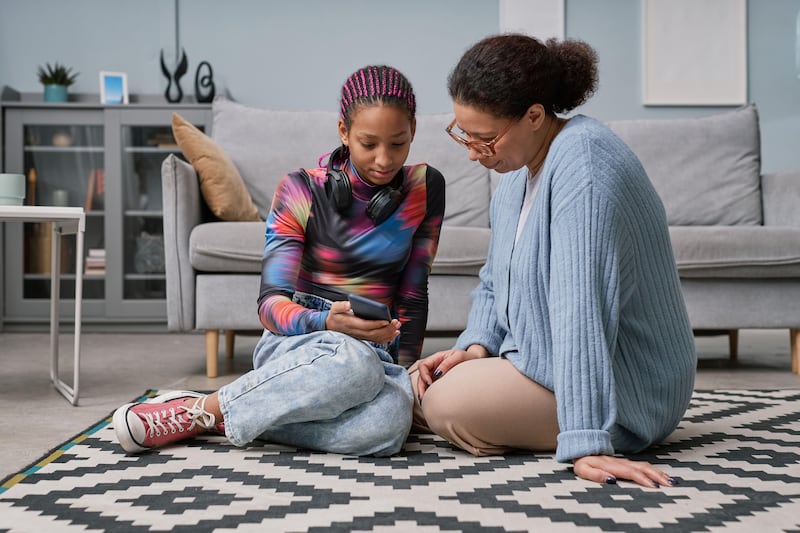The internet has become the main source of information about sexual health and relationships for nearly a fifth of teenagers, new data suggests.
The survey of 1,001 students aged 16 and 17, and conducted by Censuswide on behalf of the Sex Education Forum charity, also found 30% of young people use social media to learn about sexual orientation and gender identity.
While 22% of them use the internet to find out about pornography, and 15% started watching pornographic content to educate themselves.
But Lucy Emmerson, chief executive of the charity, has warned that this puts young people in a vulnerable position, relying on “dangerous” and “untrustworthy” information.

So how can parents talk to their teenagers about their sexual health in a non-judgemental way?
Here’s how to get the conversation started.
1. Try to stay open-minded
Teens will be trying to navigate the realities of sex education and this can be really challenging.
“The key to supporting them is to ensure they feel able to speak to you if they have questions or are concerned about anything,” said Laura Coryton MBE, director and founder of Sex Ed Matters.
“To help with this, stay open-minded and non-judgemental. This will help create a safe space for them to open up when they need support.”
Parenting expert Kirsty Ketley, who runs Auntie K’s childcare and consultancy service, added: “It’s best to not judge your child or lecture them and instead try a more child-led approach, reinforcing that you are there if they need you and that their GP or local sexual health clinic is always available to help should they feel more comfortable with using their services instead.”
2. Let them teach you
As Coryton points out, children are facing realities which simply didn’t exist a few decades ago, including things like ‘sexting’ and ‘deepfakes’ (a video or image of a person in which their face or body has been digitally altered).
“Let your children teach you what is happening today, so they feel in control and able to speak with you, without concern you may try to tell them what to do or control them,” she said.

“If they can speak with you about these problems, they will be more likely to speak with their future partners and therefore, they will likely be safer and happier.”
3. Don’t scare them
Try not to focus on the negative aspects of sex education.
“Focusing on problems like sexual harassment, STIs or worst-case scenarios might scare children and turn them off the conversation altogether. Instead, you can focus on what challenges your child actually faces and the steps they can take to overcome the challenge and make a positive difference,” said Coryton.
“For example, if they’re experiencing sexual harassment, focus on why this is wrong [and] how they can use their voice to tell a teacher.
“Reframing sex education in this positive way can empower your child and make a big difference.”
4. Build a good relationship
Ketley agreed that talking to teens about what can feel like ‘taboo’ subjects can be tricky for many parents, but they are essential conversations to have.
“Building a good relationship from when children are young, where your child feels able to come to you and talk about anything, will help as your child reaches the teen years.
“It’s important to start conversations about bodies, consent and relationships early too – teaching them about boundaries, who and what is ‘safe’ how to have respectful relationships.”
5. Don’t schedule a time to chat
“It’s best to use everyday situations and experiences as learning and talking opportunities,” said Ketley.
“Teens respond better to chats that happen when you are out in the car, or walking somewhere as they can feel less confrontational, so those times where you are playing ‘taxi’ can be useful to have the more awkward conversations.”
6. Admit that it’s awkward
Like with anything online, kids need to be taught that particularly on social media, a lot can be false information and instead be shown where to find info that is reliable and true.
“It can be awkward for parents to have these conversations and it’s OK to admit to your child that you feel embarrassed or that you don’t know the answers to their questions. Let them know that you are open to finding out the answers and helping them,” said Ketley.
What professional services can you point teens towards?
On top of GPs, there are local clinics offering a range of services including contraception, STI checks and abortion referrals. The NHS website has a search engine to find your nearest clinic, and it can be a good idea for teens to know where this is so they feel comfortable accessing its services when they need to.
Brook is a sexual health service for people under 25, who also run clinics across the UK.
There are several good apps and websites too. On teen wellbeing app, Luna, teenagers can ask anonymous questions and receive medically-backed responses, learn about content tailored to adolescents, as well as track their periods, mood, skin, and sleep, said co-founder Jas Schembri-Stothart.
“It’s a closed community, championing safe, medically-verified advice, making it the ideal platform to learn about sexual health with zero judgement,” she says.
There’s also Fumble, a digital sex-ed resource for the 21st century, and a registered charity. It aims to make sexual health education inclusive and accessible for all genders, sexualities and backgrounds.








